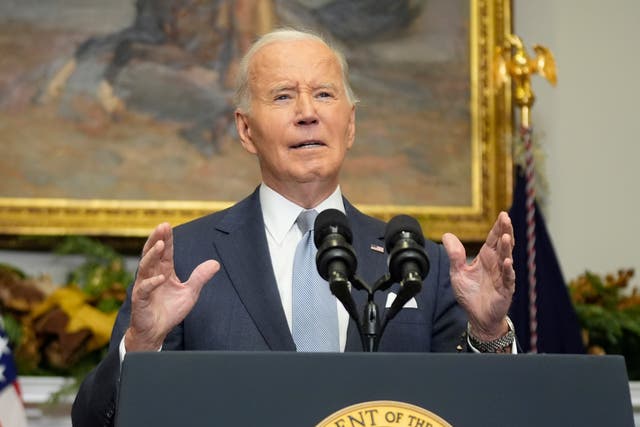Across the Middle East and beyond, the fall of Syria’s authoritarian government at the hands of jihadi militants set off waves of jubilation, trepidation and alarm.
Expatriate Syrians and many residents across the Middle East exulted at the overthrow of a leader who led his country through 14 years of civil strife that left half a million Syrians dead and displaced millions to countries around the world.
While others are worried about further instability rocking a region already in turmoil. Governments — whether allies or opponents of Bashar Assad — scrambled to absorb the sudden, stunning development and assess the implications for the Middle East and the world.

Mr Biden credited action by the US and its allies for weakening Syria’s backers — Russia, Iran and Hezbollah. He said “for the first time” that they could no longer defend Mr Assad’s grip on power.
“Our approach has shifted the balance of power in the Middle East,” Mr Biden said.

The US has about 900 troops in Syria, including US forces working with Kurdish allies in the opposition-held north east to prevent any resurgence of the Islamic State group.
In Lebanon, thousands of Syrians headed for the Masnaa border crossing to return to their home country, despite the uncertainty.
“Anything is better than Bashar,” said Sami Abdel-Latif, a refugee from Hama who was heading back to join his wife and four children.
“This is a feeling we’ve been waiting 14 years for,” said Malak Matar, who was preparing to return to the capital of Damascus. Now, he said, “Syrians have to create a state that is well organised and take care of their country.”
Many citizens in Syria’s neighbouring countries reacted with joy to the news Mr Assad was gone.

“I believe that the future is beautiful and prosperous for the Syrians,” he said.
Syria’s neighbours stepped up security along their borders. Lebanon said it was closing all but one of its land border crossings with Syria. Jordan also closed a border crossing.
Iran, a key ally of Mr Assad, said the Syrian people should decide their country’s future “without destructive, coercive foreign intervention”.
The Foreign Ministry in Tehran said Iran supports Syria’s unity and national sovereignty and hopes to see “the end of military conflicts, the prevention of terrorist activities and the start of a national dialogue” with the participation of all groups.

Egypt’s foreign ministry urged a “comprehensive political process” to establish a new era of peace in the war-torn country.
The head of Yemen’s internationally recognised government welcomed the fall of Mr Assad as “a historic moment”.
Turkey has backed anti-Assad militant groups in Syria and could play a key role in what happens next. Turkish Foreign Minister Hakan Fidan said the fall of Assad brought “hope” and he called on the world to help “unite and reconstruct” Syria.
In Europe, many governments welcomed Mr Assad’s departure while urging a rapid return to stability.

France’s foreign ministry welcomed the fall of Mr Assad, saying “the Syrian people have suffered too much”.
British Prime Minister Sir Keir Starmer also welcomed the end of Mr Assad’s “barbaric regime”.
“We call on all sides to protect civilians and minorities and ensure essential aid can reach the most vulnerable in the coming hours and days,” he said.
United Nations Secretary-General Antonio Guterres also called for calm and urged work to ensure an “orderly political transition to renewed institutions”.

State media later reported that Mr Assad was in Moscow with his family and they had been granted asylum.
Foreign Minister Andrii Sybiha of Ukraine, which is at war with Russia, wrote on X that the ousted Syrian leader had suffered the fate of “all dictators who bet on (Russian President Vladimir) Putin. He always betrays those who rely on him”.






